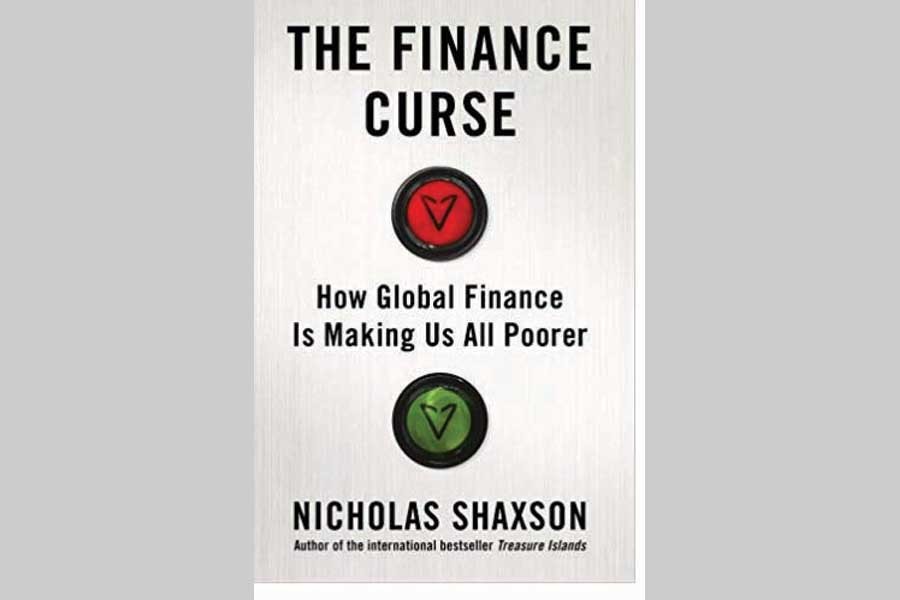Nicholas Shaxson is a journalist, a campaigner and an expert on both tax havens and financial centres. Some of his other books include, Treasure Island: Uncovering the Damage of Offshore Banking and Tax Havens, Poisoned Wells: The Dirty Politics of African Oil, and Nigeria's Implementation of the Extractive Industries Transparency Initiative. His Treasure Islands had shed light on Britain's tax havens. The reviewed book highlights the intricacies of the global financial system which is increasing poverty and inequality.
There is no denying the fact that globalisation has helped increase wealth for a group of people. But what is truer is the fact that under the pretext of globalisation, a significant amount of wealth has been amassed by only a few pair of hands across the world. In this book, Shaxson explains how this is happening in this book.
The main weapon, according to him, is financialisation. He defined financialisation as the increase in size and importance of a country's financial sector relative to its overall economy. The philosophy behind financialisation is that there is more profit by making money from money than through sale, marketing and engineering of products. Financial instruments provide quick returns with little fuss.
In the introductory chapter, the author stated: "Half a century ago it was widely accepted that the purpose of corporation was not just to make profits, but also to serve employees, communities and wider society. In the era of financialisation of the last few decades our businesses have undergone a massive transformation. The purpose of business has been whittled down to little more than a single minded focus on maximising the wealth of share holders, the owners of those companies" (P-9). In chapter 2, 'Neo-liberalism across borders' the author has elaborately discussed how the honest intentions of the intellectuals of Bretton Woods conference were destroyed. British economist Keynes and his US counterpart Harry Dexter White hammered out an agreement that a global system, of negotiated co-operation to curb flows of financial capital across borders and poor countries from these destabilising tides of hot money, be set up. But this objective could not be continued for too long. Within a few years, neo-liberalisation came up. Its mottos were: financial deregulation, privatisation and globalisation. Of course, there was a background which could not be overlooked outright. According to this view, the government inevitably amasses power and heads towards tyranny. The rise of Soviet totalitarianism also added fuel to the fire. In the 1980's, the US President Ronald Reagan and the British Prime Minister Margaret Thatcher pleaded for implementing the principles of neo-liberalism. According to them, the government was a hindrance to the economic growth of a state. According to Reagan, the surplus wealth of the rich would trickle down to the poor.
But in reality, this did not happen. Wealth has concentrated in the hands of a few. In the process, the divide between the rich and the poor continues to increase globally.
In the book, it has been extensively narrated how the wealth has been devoured by the kleptocrats through tax havens like Luxembourg, Jersey Islands across English Channel, Caymen Islands and a few others. A few years back in a G-7 conference, it was expressed that about US$ 20,000 billion worth of taxes were evaded through these tax havens. But subsequently the matter was not pursued.
The other shed light of a very important tax haven in the following excerpt: "Luxembourg has a long history of welcoming the world's criminal money with few questions asked and barely enforcing even its own law when it gets there". Previously five global audit firms used to audit almost 90 per cent of the world's corporations. One of them, Andersen, collapsed with Enron, the seventh biggest global company in the USA in 2001. According to the author, the remaining four tax firms have reached into multiple areas while cooking up tax dodge schemes for these same companies. The jobs of the audit firms have been easier due to the growth of financialisation.
The reviewed book is highly informative and has given the correct picture about great concentration of wealth linked with predatory money laundering. Nicholas Shaxson revealed the dark hearts of tax havens long before the Panama and Paradise Papers. Bangladesh is also feeling the heat of financialisation as $ 5.90 billion was siphoned out of the country in a single year.
Abuse of financialisation is breeding inequality in the global economy. Economists and scholars around the world need to find a way to restore economic equality globally rather than to wait for some catastrophe to occur like mass mobilisation warfare, transformative revolution or state collapse, as discussed by Walter Schiedel in his famous book The Great Levellers.


